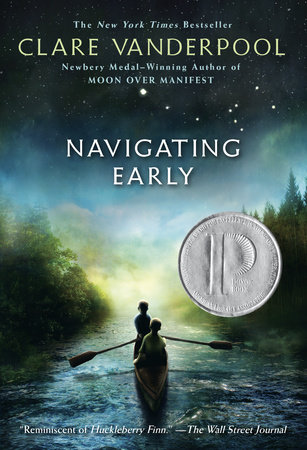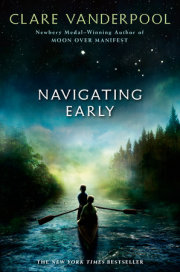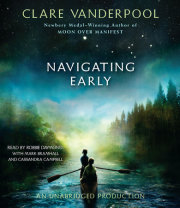The first time you see the ocean is supposed to be either exhilarating or terrifying. I wish I could say it was one of those for me. I just threw up, right there on the rocky shore.
We'd flown to Maine a few hours earlier on a military cargo plane. The big beast lurched and rattled the whole way while my father read over some manuals on naval preparedness and coastal fortification. I felt queasy before boarding the plane, was nauseous by the time we were over Missouri, and clutched the barf bag over most of Ohio, Pennsylvania, and New York. The captain--my father, that is, not the pilot--didn't say anything, but I knew he had to be thinking his son would never make it in the navy with such motion sickness. Besides, my green face wouldn't go well against a smart navy uniform. I watched him out of the corner of my eye, still not used to being around him.
I was nine when he left, and he'd been gone for four years in the European Theater. When I was younger, I thought that was a place where they showed movies. But from what he said, and more from what he didn't say, there was nothing make-believe about it.
Last spring, the war in Europe started winding down, and my mom and I were looking forward to my dad's homecoming. We'd have our own welcome-home parade, with streamers and cowbells and homemade ice cream. I could imagine my father in his crisp blue uniform, with all his medals for bravery pinned above his breast pocket. He would plant a kiss on my mom's cheek and he'd ruffle my hair like he always used to.
But when my father came back to Kansas, it wasn't for a parade. It was for a funeral. My mom's. It was a misty day in July. Mom would have liked that. She always said that for her frizzy hair, a steady drizzle was the next best thing to a permanent wave.
So, long story short, there was no ice cream. My mom wasn't there for him to kiss. I wasn't nine anymore, so he didn't ruffle my hair. And from the start, we seemed less like father and son and more like two strangers living in the same house.
I guess that shouldn't have been a surprise, though. When he'd left I was a kid reading superhero comic books on the living room floor, waiting for my mom to call me to wash up for supper. When he came back, I was a thirteen-year-old boy with no mom and a dad I barely knew. And I didn't believe in superheroes anymore.
Anyway, that was how I ended up in a cargo plane heading to Cape Fealty, Maine, and Morton Hill Academy. It was the nearest boys' boarding school to the Portsmouth Naval Shipyard, where my father was stationed.
After a bumpy landing, a military jeep drove us to the school. As we approached Morton Hill Academy, I read the words etched into the arched stone entryway. It was the Marine Corps' motto: Semper Fidelis--"Always Faithful."
We passed through and arrived at the dormitory. Arrangements had been made with Mr. Conrady, the headmaster, to get me enrolled at this late date in August, and for that I should have been grateful. But right then, the only thing I was grateful for was that I would soon be out of that jeep and standing on solid ground.
Headmaster Conrady greeted my father by his first name and shook my hand so firmly I winced. He led us on a sweeping tour of the campus. Morton Hill Academy was a prep school for boys established in 1870, but from the names of buildings and fields he mentioned, I thought it must have been a military school. He pointed out the two classroom buildings, Lexington Hall and Concord Hall. Lexington was the upper school, for ninth through twelfth grades, and Concord was for sixth, seventh, and eighth. He showed us the dormitories: Fort O'Brien for the high school boys, so named for the fort built near the site of the first naval battle of the Revolutionary War. Camp Keyes, for the younger boys, was where I would be stationed--I mean staying. Pershing Field and Flanders Field House, the former named for a general and the latter for a battlefield in World War I, were the athletic field and gymnasium, perched at the top of a hill overlooking the ocean.
The newest buildings were the Normandy Greenhouse and Dunkirk Commons, aka the mess hall. When Headmaster Conrady pointed out the white clapboard chapel, I wondered whether there might be at least one structure with a softer name, like Church of the Good Shepherd or Chapel of the Non-Weapon-Bearing Angels. No such luck. Armistice Chapel was a place of peace, but only if you signed the treaty and sat at attention.
The remaining building from the original 1870 campus--and the only structure that had escaped the onslaught of military names--was the boathouse, affectionately called the Nook.
When Headmaster Conrady prepared to leave us at the dormitory, he had a few words in private with my father. I gathered from the look on his face and the occasional glance at me that he was expressing his condolences for the loss of the captain's wife and offering words of assurance that the school would provide a healthy environment for his queasy son.
In a louder voice meant for me to hear, Headmaster Conrady said, "We'll take good care of him. He'll be a new man when you come back for the Fall Regatta."
I didn't know what the Fall Regatta was. It sounded like a dance, although at an all-boys school I didn't know who we'd be dancing with.
Copyright © 2013 by Clare Vanderpool. All rights reserved. No part of this excerpt may be reproduced or reprinted without permission in writing from the publisher.








